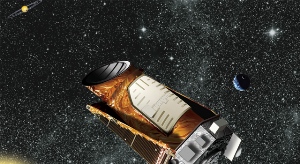Apr 16 2014
NASA will host a news teleconference at 11 a.m. PDT (2 p.m. EDT) Thursday, April 17, to announce a new discovery made by its planet-hunting mission, the Kepler Space Telescope.
 Artist's concept of NASA's Kepler space telescope. Image credit: NASA/JPL-Caltech
Artist's concept of NASA's Kepler space telescope. Image credit: NASA/JPL-Caltech
The journal Science has embargoed the findings until the time of the news conference.
The briefing participants are:
- Douglas Hudgins, exoplanet exploration program scientist, NASA's Astrophysics Division in Washington
- Elisa Quintana, research scientist, SETI Institute at NASA's Ames Research Center in Moffett Field, Calif.
- Tom Barclay, research scientist, Bay Area Environmental Research Institute at Ames
- Victoria Meadows, professor of astronomy at the University of Washington, Seattle, and principal investigator for the Virtual Planetary Laboratory, a team in the NASA Astrobiology Institute at Ames
Launched in March 2009, Kepler is the first NASA mission capable of finding Earth-size planets in or near the habitable zone -- the range of distance from a star in which the surface temperature of an orbiting planet might sustain liquid water. The telescope has since detected planets and planet candidates spanning a wide range of sizes and orbital distances, including those in the habitable zone. These findings have led to a better understanding of our place in the galaxy.
The public is invited to listen to the teleconference live on UStream at: http://www.ustream.tv/channel/nasa-arc and http://www.ustream.tv/nasajpl2
Audio of the teleconference also will be streamed live at: http://www.nasa.gov/newsaudio
Questions can be submitted on Twitter using the hashtag #AskNASA.
A link to relevant graphics will be posted at the start of the teleconference on NASA's Kepler site: http://www.nasa.gov/kepler
Source: http://www.jpl.nasa.gov/